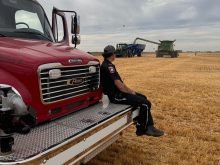Fostering psychologically safe workplaces is also seen as playing an important role in hiring and retaining farm employees
The executive director of AgSafe Alberta says her experience with mental health issues on the farm stretches back to seeing the effect of sky-high interest rates in the 1980s, the difficulties of the hog sector while working with Alberta Pork and now in her current role.
“Having a psychologically safe workplace is not something that we’ve talked a lot about in agriculture and it’s something we need to start talking about,” Jody Wacowich recently told the National Symposium on Agricultural Mental Health.
Read Also

Support needed at all levels for high-value solar projects
Farmers, rural municipalities and governments should welcome any opportunity to get involved in large-scale solar power installations, say agrivoltaics proponents.
“If we are mentally healthy, we’re going to be a lot safer on the farm. That’s where it critically comes into play.”
Alcohol and drugs are sometimes used to manage stress, which can exacerbate the mental health challenges of an individual and those around them, Wacowich said.
“And knowing that agriculture is challenged to find bodies to work. I think this is going to be a critical component of the things we need to look at as we are hiring people and trying to keep them on our farms,” she said.
As part of the effort to address mental health issues in the province, AgSafe Alberta launched its “In the Know” virtual mental health literacy workshop in 2021, while the organization has been lobbying the provincial government to establish a farm mental health network.
“Also, to work on building mental health capacity within the province for farms and ranches, enhancing the farm culture and knowledge among health-care providers and supporting community-based programs,” said Wacowich.
AgSafe has also been supportive of the AgKnow mental health network, which aims to remove the stigma surrounding mental health issues. It also supports those in the health-care field who understand the agricultural lifestyle and who can provide support based on the unique challenges it faces.
The issue of mental health supports being provided is critical, according to Gerry Friesen, co-founder of the Manitoba Farmer Wellness Program, during a seminar on wellness programs in Canada.
“We needed individuals with an in-depth knowledge of the uniqueness of agriculture,” said Friesen of one of the critical features of his program.
One of the unique features is how small the agricultural community is and the effect that has on people suffering from stress-related mental health problems to step forward to get help.
“It seems like any move you make is seen by other people and very quickly becomes coffeeshop talk,” said Friesen, an issue that is compounded by long wait times to access health providers that can also involve complicated processes.
Friesen said his organization aims to cut through those issues by providing a streamlined confidential system that will put individuals together with those health providers in a timely fashion.
In the last two years, and through the admittedly pushy tactics by Friesen, Manitoba farmers have been able to access supports from those with a background in agriculture.
But both Wacowich and Friesen say funding mental health programs for those in the ag sector continues to be challenging.
Grants and donations have provided money to get programs off the ground, but a stable funding model is elusive.
“Uptake is increasing,” said Friesen.
He also outlined his own struggles on the farm and how he has been asked multiple times whether he would access mental health programs if they were available at the time.
“The absolute clear answer is yes,” said Friesen, going on to explain how medication wasn’t addressing his issues, while not having access to a psychologist with a background in agriculture complicated matters.
A national survey of farmers conducted by the University of Guelph and released last year found that 76 percent of agricultural workers experienced moderate or high stress levels. A quarter of respondents reported feeling their life was not worth living, wished they were dead or had thoughts of suicide within a year of the study.
















